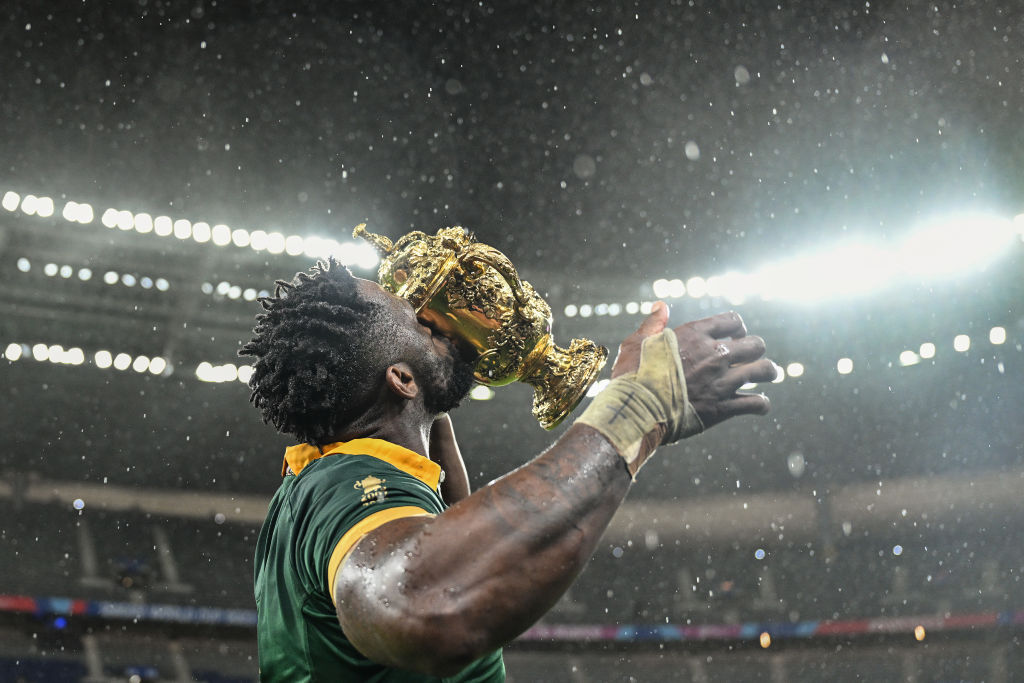Rugby World Cup win will always mean more to South Africa than any other

Does Saturday’s all-consuming, ferocious, edge-of-the-seat Rugby World Cup final between New Zealand and South Africa have an argument for being described as the very best final ever? Simple answer: yes.
Because the Springboks’ 12-11 victory over the All Blacks in Paris had a little bit of everything. It had fire and fireworks, crunching hits, red cards, controversy, attempted drop goals and the iconic image of South Africa captain Siya Kolisi lifting the William Webb Ellis Trophy for the second consecutive time.
The World Cup means everything to every country that has managed to get their hands on its golden handles, but it always seems to mean just that little bit more to South Africa.
South Africa meaning
A country full of divisions, where new cracks have replaced old ones, a nation so often reminded of issues of the past; South Africa’s 1995 triumph – also against New Zealand – has always been an incredible sporting moment, where Nelson Mandela’s name was chanted around the four stands of Ellis Park in Johannesburg.
And nearly 30 years on the sight of a black captain, who he himself notes 1995 as a key inspiration, lifting the gold plated trophy for the second time, in front of 80,000 fans, just had a feeling of a moment transcending sport.
But the 80 minutes itself was brutal.
Bongi Mbonambi, the hooker who was cleared for lack of evidence last week of calling England flanker Tom Curry a “white c***”, was forced off after Shannon Frizell fell onto his leg and received a yellow card.
All Blacks captain Sam Cane was then red carded for a clear and obvious high shot to earn himself the tag of the first man to be sent off in a Rugby World Cup final.
Springbok captain Kolisi also found himself carded by referee Wayne Barnes for a less severe high shot before compatriot Cheslin Kolbe saw 10 minutes on the sidelines for a deliberate knock-on.
Sometimes cards ruin games, but not this one. Masterminded by Barnes and his officials, the game somehow managed to flow in the periods between the disciplinaries.
Handre Pollard slotted his four attempts at goal, meaning he finished the tournament with a 100 per cent kicking record, while the likes of All Black Beauden Barrett and Pieter-Steph du Toit had incredible matches.
Deadly duo
But two members of the Springbok side who played no part on matchday but who were key in the South Africa win were Manie Libbok and Cobus Reinach.
The fly-half and No9 were dropped from the starting line-up, and entirely from the matchday 23, to make way for a forward-heavy split on the bench.
But reports suggest that the half-back duo spent much of the week pretending to be their opposite numbers Richie Mo’unga and Aaron Smith; playing like them, training like them, kicking like them, in order to ready their teammates for the final.
Those kinds of marginal gains are the ones head coach and director of rugby Jacques Nienaber and Rassie Erasmus may point to as key for South Africa in their victory and it marks a fascinating development in the way teams prepare for such big games.
World Cup history
So, yes, Saturday’s match will be in the picture as one of the best Rugby World Cup finals ever but the result means much more than a fourth crown for the Rainbow Nation.
Because when the 23 players who started the World Cup final lifted the William Webb Ellis trophy, it meant much more than everything to just those players. It meant everything to a nation; a nation where sport has aided a drive for change that matters much more than it ever has for most others.